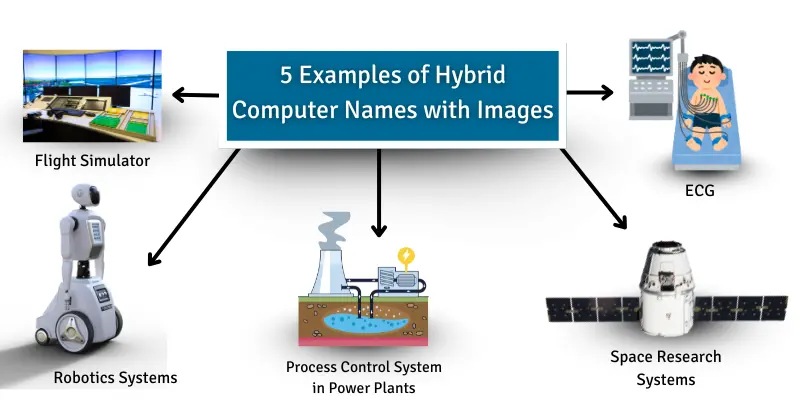Introduction
In the modern digital era, computers are no longer just tools; they have become the backbone of every industry. From education to business, from healthcare to space research, different types of computers are used for different purposes. One of the most fascinating and powerful categories among them is the Hybrid Computer. Many people are familiar with digital computers (like laptops and smartphones) and analog computers (used in scientific measurements), but when these two are combined, we get a hybrid computer.
In this article, we will explore what is a hybrid computer, how it works, its features, advantages, disadvantages, and real-world applications. We will also briefly connect the concept of Clouds Computer and how hybrid computing can integrate with cloud technology in the modern world.
What is Hybrid Computer?
A Hybrid Computer is a type of computer system that combines the features of both digital computers and analog computers.
- Digital computers work on binary data (0s and 1s). They are accurate, fast, and reliable for logical operations, data storage, and calculations.
- Analog computers deal with continuous signals. They are useful for solving complex equations, measuring real-time data, and working with approximate values.
A hybrid computer merges these two capabilities. It can process continuous data like an analog system and at the same time provide precise calculations and data storage like a digital system.
Example:
A hospital patient monitoring system is a good example. The machine receives analog signals from a patient’s body (heartbeat, temperature, blood pressure) and converts them into digital form for accurate analysis, display, and long-term record keeping.
Features of Hybrid Computer
- Dual Nature – Works as both analog and digital system.
- High Speed – Processes real-time signals and performs calculations instantly.
- Accuracy – Combines approximate results with exact digital data.
- Real-Time Data Processing – Commonly used where instant response is required.
- Costly but Efficient – More expensive than simple digital computers but highly efficient in specialized fields.
How Does a Hybrid Computer Work?
The working mechanism of a hybrid computer involves:
- Input of Data – Continuous (analog) signals or digital data are received.
- Conversion – If the input is analog, it is converted into digital form using an ADC (Analog-to-Digital Converter).
- Processing – The digital part performs logical operations, calculations, and storage.
- Output – Results are displayed either in digital form (numbers, graphs) or converted back to analog signals if required.
Advantages of Hybrid Computers
- Combines Strengths – Uses the accuracy of digital systems with the real-time processing of analog systems.
- Versatility – Can be applied in diverse industries like healthcare, weather forecasting, space research, and engineering.
- Real-Time Performance – Essential where quick results are required without delays.
- Data Storage – Unlike analog-only computers, hybrid systems can store data digitally for future use.
Disadvantages of Hybrid Computers
- Expensive – Cost is much higher compared to ordinary computers.
- Complex Design – Requires advanced hardware and software integration.
- Limited Use – Mainly used in specialized industries, not for everyday tasks.
- Maintenance Issues – Harder to maintain and repair compared to digital systems.
Applications of Hybrid Computers
- Healthcare – Patient monitoring, medical imaging machines like ECG and MRI.
- Aviation and Defense – Used in radar, flight simulators, and missile systems.
- Research Centers – Nuclear science, weather forecasting, and space exploration.
- Industrial Control Systems – Power plants, oil refineries, and manufacturing units.
- Engineering – Used in solving differential equations, modeling, and simulations.
Relation of Hybrid Computers with Clouds Computer
Now comes the important part – how Clouds Computer (Cloud Computing) connects with the concept of hybrid computers.
- Clouds Computer refers to using cloud-based servers and resources to store, process, and manage data over the internet instead of relying only on a local machine.
- Hybrid computers can work together with cloud systems for faster data analysis. For example:
- A hospital using hybrid computers for patient monitoring can store and analyze the collected data in a clouds computer environment for better decision-making.
- Weather forecasting centers use hybrid systems to collect real-time analog data, and then cloud computing is used to store massive datasets and run predictive models.
- Industrial IoT devices (smart sensors) generate analog signals, hybrid computers process them, and clouds computer platforms provide remote access and big data analysis.
- A hospital using hybrid computers for patient monitoring can store and analyze the collected data in a clouds computer environment for better decision-making.
Thus, combining Hybrid Computers with Clouds Computer technology creates a powerful system that is fast, scalable, and accessible worldwide.
Future of Hybrid Computers and Clouds Computer
The future will see more integration of hybrid computers with cloud-based platforms. With the rise of Artificial Intelligence (AI), Machine Learning (ML), and Big Data, hybrid systems will process real-time signals and cloud systems will handle large-scale storage and analytics.
- In healthcare, real-time patient monitoring will integrate with global health databases.
- In climate studies, hybrid systems will collect analog signals, while clouds computer networks will analyze long-term climate patterns.
- In autonomous vehicles, hybrid computers will process real-time driving signals, while cloud systems will update maps and traffic data.
Conclusion
To summarize, what is a hybrid computer? It is a powerful machine that combines the real-time processing of analog computers with the accuracy and storage of digital computers. These systems are widely used in healthcare, aviation, research, and industries where real-time accurate results are required.
When we integrate hybrid computers with Clouds Computer technology, the result is an even more powerful, flexible, and scalable system capable of solving modern challenges. While expensive and complex, hybrid computers represent the bridge between the physical world of continuous signals and the digital world of data-driven intelligence.


